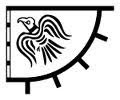 |
| 1iDanelaw Flag |
 |
| medieval depiction of Vikings raiding England |
910 The last major Viking army, the 'Danelaw Vikings', are defeated at the Battle of Tettenhall by the allied forces of Mercia and Wessex, led by King Edward, son of Alfred the Great, and the Earl Aethelred. The Danelaw was the region of northeastern England, where the Danes were in control, and Danish law was observed, not English law. Because of population increases in Scandinavia, Vikings had begun to settle instead of raiding and then leaving in the latter 800s. Under Alfred the Great, and his son who became known as King Edward the Elder, after this turning point battle the Danelaw eventually returned to the control of England. Danish names in the Danelaw continue in modern times, such as Jorvik becoming Eoferic, which eventually became modern York, as an example. This era produced some wonderfully named monarchs and generals; - Aethelred the Unready, Ivar the Boneless who led the Greath Heathen Army, Eric Bloodaxe, Harold Harefoot, and Edward the Confessor, among others.
1305 William Wallace, who led Scottish resistance to England, is captured by the English near Glasgow and transported to London where he is put on trial and executed. His head is displayed on the London Bridge.
1583 Sir Humphrey Gilbert establishes first English colony in North America, at what is now St John's, Newfoundland. He was a half-brother to Sir Walter Raleigh, one of Queen Elizabeth I's adventurers.
1620 The Mayflower and Speedwell depart from Southampton, England on its first attempt to reach North America, but turn back because of a supposed leak. The second attempt also resulted in a leak, but it was discovered the leak was in fact minor sabotage. The crew was unwilling to undertake thee year long commitment that the voyage entailed.
 |
| lawyer Andrew Hamilton |
1735 Freedom of the press: New York Weekly Journal writer John Peter Zenger is acquitted of seditious libel against the royal governor of New York, on the basis that what he had published was true. The case was a legal landmark in libel cases. Zenger was a German immigrant, who printed but did not actually write, criticism of Governor William Cosby. Cosby wanted the paper, the New York Weekly Journal, burned; the Assembly wouldn't give him permission. Governor Cosby then had Zenger arrested on charges of sedition, and hand picked the two-man court that tried the case. Cosby then had Zenger's two lawyers disbarred; these lawyers were part of the opposition party behind the allegedly seditious critical series of articles. His replacement lawyer, Scottish immigrant Andrew Hamilton, won the case and established the precedent that newspapers had "a liberty both of exposing and opposing tyrannical power by speaking and writing truth." Hamilton had taken the case pro bono, and Hamilton may - or may not - have been his real name; he is something of an enigma.
1850 Birth of Guy de Maupassant, French novelist, and master of the short story, and hater of the Eiffel Tower.
1858 Cyrus West Field and others complete the first transatlantic telegraph cable after several unsuccessful attempts. It operated for less than a month. It changed communication between the two sides of the Atlantic from ten days or more, to a matter of minutes. Four more attempts were required to get the transatlantic telegraph working and keep it working. The first message was from Queen Victoria, to President Buchanan.
1861 American Civil War: In order to help pay for the war effort, the United States government levies the first income tax as part of the Revenue Act of 1861 (3% of all incomes over US $800; rescinded in 1872).
 |
| Standard Oil, circa 1882 |
The United States Army abolishes flogging.
1884 The cornerstone for the Statue of Liberty is laid on Bedloe's Island in New York Harbor.
 |
| 1914 traffic lights |
1930 Birth of Neil Armstrong, American astronaut, and the first man to walk on the moon.
1944 World War II: possibly the biggest prison breakout in history occurs as 545 Japanese POWs attempt to escape outside the town of Cowra, NSW, Australia.
 |
| Mandela's cell |
Holocaust: Polish insurgents liberate a German labor camp in Warsaw, freeing 348 Jewish prisoners.
1964 Vietnam War: Operation Pierce Arrow – American aircraft from carriers USS Ticonderoga and USS Constellation bomb North Vietnam in retaliation for strikes attacked U.S. destroyers in the Gulf of Tonkin.
1979 In Afghanistan, Maoists undertake an attempted military uprising.
 |
| Striking Air-Traffic Controllers |
1981 Ronald Reagan fires 11,359 striking air-traffic controllers who ignored his order for them to return to work.
1995 The city of Knin, a significant Serb stronghold, is captured by Croatian forces during Operation Storm. The date is celebrated as the Victory Day (Croatia).
2001 Afghanistan's ruling Taliban jailed eight foreign aid workers, including two Americans, for preaching Christianity.
2003 A car bomb explodes in the Indonesian capital of Jakarta outside the Marriott Hotel killing 12 and injuring 150.
 |
| Marriott restaurant damage |
2009 Mahmoud Ahmadinejad was sworn in for a second term as Iran's president. He is the leader of the political coalition "Alliance of Builders of Islamic Iran". His 2990 election caused wide spread rioting and protests over allegations of blatant voter fraud, and challenging the legitimacy of his election. He continues to be a Holocaust denier, and to advocate Israel should be "wiped off the map".

No comments:
Post a Comment